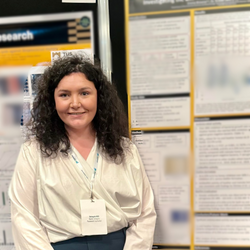Meet Early Career Microbiologist of the Year poster finalist: Emma Browne

What are your current research interests?
I am interested in medical biotechnology. My research is determining the medicinal properties of Irish monofloral honey and their suitability as wound healing agents. I really enjoy this research because I don’t work in one field alone but across a range of disciplinary areas such as molecular biology looking at the immunomodulatory properties of honey, microbiology assessing the honey’ antimicrobial properties, a little bit of chemistry with HPLC analysis of the honey’ phenolic compounds and even some polymer engineering incorporating the honey’ into hydrogels. Working in a multidisciplinary research area can be a challenge at times, moving from one area to another but it is also what makes it enjoyable.
What inspired you to go into this field of work?
My undergraduate degree is in veterinary nursing. In college, this was combined with several science modules, and this is where I found my love for all things biology and research. I always enjoyed the pharmaceutical and diagnostic labs the most, trying to understand how a drug might affect an animal or how an infection or disease might be treated. Combining my interest in veterinary, medicine, and science with my PhD has been an amazing opportunity and has given me the experience to further my career in veterinary medicine research in the future.
What advice would you share with someone interested in working in this field?
Try it. If you have any interest but are afraid you won’t be “smart” enough or don’t have the right background, just try it anyway. I went into IT after secondary school because I didn’t think I would be able to do any type of science courses, let alone go into research. On a long windy road, I ended up doing a course that had some biology modules and I realised it wasn’t as impossible as I thought. So, try it. You will never know if you are able for it or not if you don’t attempt it.
What do you love most about your job?
As much as failed experiments drive me mad, I also thrive on them. Figuring out what the problems are, trying different troubleshooting options and the eventual satisfaction when an experiment is up and running can be a moment of pride. Knowing that the research I do will contribute in some way to society and the future is also a privilege and one I enjoy being a part of.
How do Society events, such as Annual Conference, promote your professional development?
Attending Microbiology Society events has allowed me to network with people, foster new professional relationships and open up the option to collaborate with others. It has given me the chance to talk to not only students, postdocs, or principal investigators but to also talk to exhibitors and others that are in industry as well as academia. Seminars and workshops have broadened my skills and knowledge in the latest research, dissemination, and looking beyond the end of my PhD.
You can find Emma on LinkedIn.
